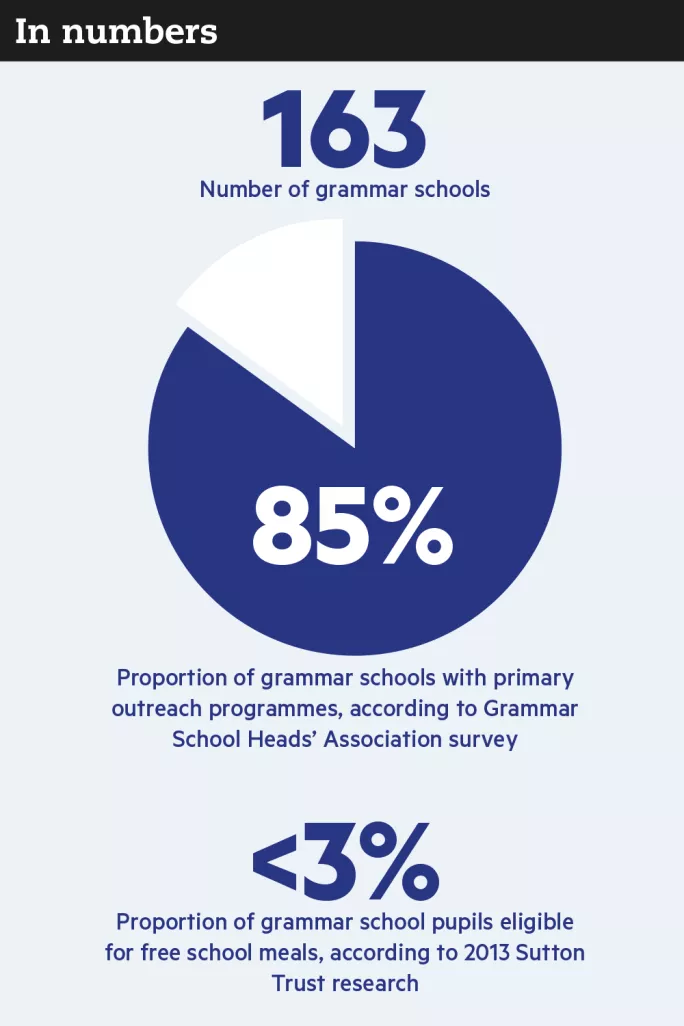Funding formula could force grammars to ditch outreach

The majority of grammars will be forced to abandon or curtail their work with disadvantaged primary school pupils if the government’s funding proposals go ahead, the Grammar School Heads’ Association (GSHA) has warned.
The organisation said selective schools would find it increasingly difficult to do outreach work aimed at encouraging primary school children to sit the 11-plus exam and helping them to pass the test.
This is despite plans - set out in a government Green Paper on expanding selection to boost social mobility - for grammars to take part in a range of outreach work to “raise aspirations, improve educational practice and promote wider access” in primary schools.
GSHA chief executive Jim Skinner said that many of the existing 163 grammar schools see primary outreach work as a vital tool for promoting social mobility, but will have to significantly reduce it if the government pushes forward with its national funding formula.
‘It may mean outreach work is difficult to develop as one might want’
“To have the impact that we want it to have, [outreach work] needs to start earlier [than Years 4 and 5] and it needs to be more intensive,” Mr Skinner said. “We see it as probably the most important aspect for increasing social mobility.”
But he warned: “The capacity to reach out to primary schools has been reduced [because of real-terms funding cuts]. Some schools have had to cut it all. And if the new formula goes through, then we are looking at two-thirds of grammar schools with less money. So it’s likely that the majority of grammar schools will have to cut back or abandon primary outreach programmes entirely.”
A recent survey by the GSHA found that most of the 46 respondents had a primary school outreach programme in place - but heads are concerned that this could fall and that the effectiveness of such schemes would deteriorate in light of funding pressures.
Peter Kent, headteacher of Lawrence Sheriff School in Rugby and a GSHA member, said: “I think for all of us it may mean [primary outreach work] is difficult to develop as one might want. Funding is tighter than I have ever remembered.”
The school is keen to continue its monthly maths masterclasses for disadvantaged primary children on Saturdays, for which teachers currently volunteer their time.
‘Dent’ to government’s plans
Lee Elliot Major, chief executive of charity the Sutton Trust, said a decline in primary outreach work would be “highly damaging” to social mobility in a selective school system.
He said: “At the moment, selective state schools are highly socially exclusive. They can improve this, but primary outreach is a fundamental part of that.”
Mr Elliot Major added that this could prove to be a “dent” to the government’s grammar school expansion plans. “Unless you can enable grammar schools to be more diverse socially, you shouldn’t consider expanding them,” he said.
Sutton Trust evidence in 2013 showed that less than 3 per cent of entrants to grammar schools were entitled to free school meals.
Mr Skinner believes that one of the most effective outreach schemes involves “bussing kids into a secondary school for a maths or English session” to improve core skills and increase motivation - but he said this involved “significant” transport and teacher costs.
However, Mr Elliot Major said less expensive approaches could be effective, if they focused on “debunking the myths around grammar schools”.

Pupil and teacher volunteering
In Birmingham, five grammar schools that are part of the King Edward VI Foundation want to continue their outreach work.
Denis Ramplin, the director of marketing and communications at the foundation, said: “Moving forward, everybody is wary about how the cuts are going to play out. We are always trying to find other ways to deliver these initiatives in a more cost-effective manner.”
He gave the example of sixth-form students at King Edward VI Five Ways School, who offer outreach work to disadvantaged primary children on Saturdays, as part of a student-leadership programme.
A Department for Education spokesperson said: “We expect all schools to help children of all backgrounds fulfil their potential and where they create more places for disadvantaged pupils, our funding formula will see their funding increase.
You need a Tes subscription to read this article
Subscribe now to read this article and get other subscriber-only content:
- Unlimited access to all Tes magazine content
- Exclusive subscriber-only stories
- Award-winning email newsletters
Already a subscriber? Log in
You need a subscription to read this article
Subscribe now to read this article and get other subscriber-only content, including:
- Unlimited access to all Tes magazine content
- Exclusive subscriber-only stories
- Award-winning email newsletters